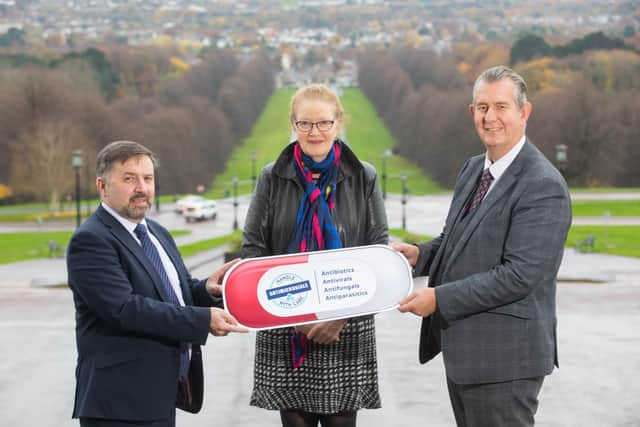Agriculture Minister pleased to support World Antimicrobial Awareness Week
and live on Freeview channel 276
Agriculture Minister Edwin Poots and Health Minister Robin Swann have stated it is “vital” to provide important advice on responsible use of antimicrobials during this week.
WAAW runs from 18-24 November this year with the overarching slogan “Antimicrobials: Handle with CARE” and a campaign message of ‘Spread Awareness, Stop Resistance’.
Advertisement
Advertisement
The aim is to increase awareness of global antimicrobial resistance (AMR) and to encourage best practice among the general public, health workers, farmers, animal health professionals and policy makers, to avoid the further emergence and spread of drug-resistant infections.


In support of WAAW, Agriculture Minister, Edwin Poots MLA, said: “I am pleased to support the World Antimicrobial Awareness Week.
“The campaign will highlight the key issues, enable you to address AMR, outline the training available through the Farm Family Key Skills program and provide guidance on preparing a herd health plan in conjunction with your vet.
“Antimicrobial resistance awareness week carries a very important warning to farmers about the dangers to animal health of over reliance on antibiotics amongst herds.
Advertisement
Advertisement
“Recently published data indicating a continuing reduction in UK antibiotic sales, in food producing animals since 2011, placing us fifth lowest across 31 European countries is an achievement to be celebrated.
“However, we must continue the fight against AMR and strive for further improvement.”
Health Minister, Robin Swann, added: “Antimicrobial resistance (AMR) is a serious and growing global public health concern.
“The use of antibiotics is essential for saving lives in conditions such as sepsis, and without effective antibiotics, even minor surgery and routine operations could become high risk procedures due to the increased likelihood of infection by resistant organisms.
Advertisement
Advertisement
“The Covid-19 pandemic has brought into stark focus the importance of maintaining and extending the efficacy of existing and emerging antimicrobials in treating infectious diseases.
“The pandemic has also highlighted the importance of infection prevention and control (IPC) measures to tackle AMR, targeting both healthcare and community infections.
“We will seek to build on the advances and investments made in these vital measures that have been integral to the Covid-19 response, but we must act strongly across public, animal and environmental health if we are to curb the silent pandemic of antimicrobial resistance.”
DAERA will be promoting the campaign alongside MyNI to highlight the risk of AMR to the agricultural and environment sectors and provide important advice on how farmers can contribute to the “One Health” fight against AMR whilst simultaneously protecting and improving animal health and welfare and ensuring a sustainable future for farming.
Advertisement
Advertisement
Farmers are encouraged to participate in the CAFRE Farm Family Key Skills Responsible Use of Antimicrobials courses that are available, free of charge, online or now in person.
For further information and to register visit https://www.cafre.ac.uk/training-courses/agriculture/
Just days ahead of WAAW, the UK Veterinary Antimicrobial Resistance and Sales Surveillance Report was published on 9 November.
This report presents data on veterinary antibiotic sales, usage and antimicrobial resistance (AMR) in food-producing animals in the UK, measuring progress towards ambitions set out in the UK’s Five Year National Action Plan, 20-year vision and the NI Action Plan ‘Changing the Culture’ to contain and control AMR.
Advertisement
Advertisement
The report shows that the UK is maintaining effective antibiotic stewardship in our livestock sector: 2020 has seen the second lowest recorded amount of antibiotics sold for use in food-producing animals, at 30.1 mg/kg, and further reductions in farm-level antibiotic use have been reported by the pig, chicken, turkey, and gamebird sectors.
You can view the report at: https://www.gov.uk/government/publications/veterinary-antimicrobial-resistance-and-sales-surveillance-2020
DAERA Chief Veterinary Officer, Dr. Robert Huey, commented: “Antimicrobial resistance (AMR) is one of the most serious threats to both public, animal and environmental health across the world. It is the silent pandemic.
“Scientists estimate that AMR is likely to have caused a third as many deaths as Covid-19 in 2020 and to cause 10 million deaths per year by 2050 if unchecked.
Advertisement
Advertisement
“As microbes evolve, new strains emerge that cannot be killed by antibiotics.
“One of the main drivers for the emergence of these drug resistant microbes is the over-use and inappropriate use of antibiotics in both humans and animals.
“The agricultural and environment sectors must continue to build on the work already done, in partnership with government within a ‘One Health’ approach, in order to ensure the continued availability of effective antimicrobials across both the human and animal health sectors.”